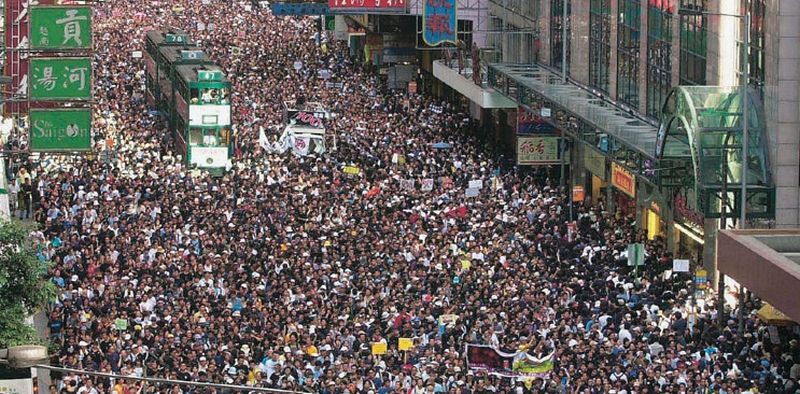The legislation of Hong Kong’s own security law, Article 23, was delayed due to the city’s fifth wave of Covid-19, the city’s security chief said on Wednesday.
The Secretary for Security, Chris Tang, also said the government expected to be subject to “smearing” by “overseas media, foreign forces, and their local agents” when it launched the legislation, and that the government would have to reassure Hongkongers in the face of such “fabrications.”

The security chief was asked about the progress of Article 23 and the government’s communication strategy by lawmaker Chan Siu-hung in the Legislative Council (LegCo) on Wednesday.
In response, Tang said the legislation had been delayed by the city’s recent Covid-19 outbreak as the Security Bureau and the Department of Justice – which were leading the enactment of the legislation – “had put controlling the pandemic as the mission that supersedes all at the beginning of the year.”
Article 23 of the Basic Law stipulates that the government shall enact laws on its own to prohibit acts of treason, secession, sedition and subversion against Beijing. Its legislation failed in 2003 following mass protests and it remained taboo until after the onset of the separate, Beijing-imposed security law in 2020. Pro-democracy advocates fear it could have a negative effect on civil liberties but the authorities say there is a constitutional duty to ratify it.

According to Tang, the law should cover “the national security risks and threats from the past and in the present,” as well as be “sufficiently forward-looking” to safeguard against “future risks,” amid “drastic changes” in international circumstances.
Addressing the press after the LegCo meeting, Tang said that the public consultation for the legislation of Article 23 was originally intended to be launched in the first half of the year. Without providing an updated timeframe, he said the legislation would be submitted to the LegCo “as soon as possible.”
Tang also said the government was “not inclined” to provide the consultation document in the form of a White Bill, which was what the Hong Kong Bar Association and civil groups asked for during the government’s first attempt to legislate Article 23 20 years ago.
A 2002 bar association statement urged the government to present the proposal in the form of a draft legislation, instead of the “very broad terms” of its original consultation document, which made it “difficult to have any meaningful discussion and consultation” about.

Tang said it may be “leading” to present the draft legislation in detail. The consultation should “embrace different views,” he said, and the drafting of the law should be left to the professionals.
‘Smearing’
The security chief told Legislative Councillors he could not rule out that “there may still be people smearing the legislative work [of Article 23] with malicious or even fake information when opportunities arise.”
Tang said the government would “proactively and promptly” make clarifications if necessary. “When it is needed, we will also hire professionals to aid with the preparation of publicity and explanatory work,” he added.
Chan asked how the government would deal with such “smearing” by “foreign forces,” which he said had been “relentlessly interfering with matters in Hong Kong and attempting to use Hong Kong as a pawn to suppress China.” Chan said he expected these forces to “demonise the right and proper national security legislation.”

Tang said that the government expected that “smearing will certainly occur” when Article 23 is enacted, and that it might come from “overseas media, foreign forces, and their local agents.”
In that case, Tang said the “constitutional duty” and “necessity” for Hong Kong’s security law would have to be explained to the public.
“If we take a look at the past, especially since 2019, we can see many acts endangering national security have emerged,” he said. There were still five areas listed under the Article 23 of the Basic Law that were not covered by Beijing’s sweeping national security legislation that was imposed on the city in June 2020, Chan added.
The five areas were treason, sedition, theft of state secrets, the prohibition of foreign political organisations or bodies from conducting political activities in Hong Kong, and banning local political groups from forming ties with foreign counterparts, as listed in the city’s Basic Law.
Support HKFP | Policies & Ethics | Error/typo? | Contact Us | Newsletter | Transparency & Annual Report | Apps
Help safeguard press freedom & keep HKFP free for all readers by supporting our team

latest national security stories























